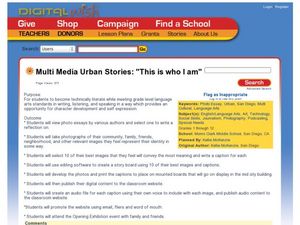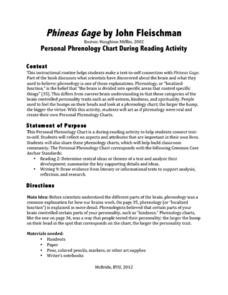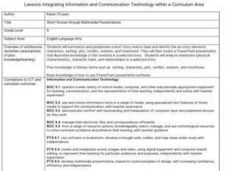Curated OER
Story Setting - The Art Lesson by Tomi dePaola
Students read the book The Art Lesson by Tomi dePaola and analyze the story. In this setting lesson, students discuss the importance of the setting and how it helps us understand the story. Students answer questions and chart their...
Curated OER
Lesson 22: As constant as the Northern Star: Examining Static and Dynamic Characters in Julius Caesar
Students examine the play Julius Caesar. In this literature analysis lesson plan, students work in groups to identify changes in various characters from the story. They examine various aspects of the character's personality and...
Curated OER
Yes, You Can!
Students examine the concept of encouragement. In this encouragement and character lesson, students participate in an active read aloud of Mary Grace's, Amazing Grace. They draw a picture in their journal of a time that they needed...
Curated OER
Multimedia Urban Stories: "This is who I am"
Students create a photo essay. In this lesson plan encouraging self-expression, students view and reflect upon photo essays. Then, they go out into the community and create their own photo essay complete with captions. Students publish...
Curated OER
Story of Self-Choosing to Participate
Everyone has a story; help your writers develop their own with this prewriting packet. Designed for upstanders to share their story and encourage others to be upstanders, this set of questions helps writers craft and structure a story to...
Novelinks
Tuck Everlasting: Time-Line Graphic Organizer Strategy
What happens first in Tuck Everlasting? What happens after that? Prompt readers to create a timeline of the events in Natalie Babbitt's novel, detailing both story sequence and character relationships.
National Endowment for the Arts
Teacher's Guide: The Great Gatsby by F. Scott Fitzgerald
A 10-lesson unit takes high schoolers through a novel study of F. Scott Fitzgerald's The Great Gatsby. To start, students learn about Fitzgerald's background and gain historical context that prepares them for a reading of the book. The...
Scholastic
Dr. Seuss Extension Activities
Extend the exhilarating learning experience of Dr. Seuss with five activities designed to reinforce literacy skills—site word reading, dialogue writing, story mapping, and more! Featured stories include The Lorax, Horton Hears a Who, The...
Novelinks
The Little Prince: Biopoem Strategy
Learn about character traits with a biopoem activity. Based on Antoine de Saint-Exupéry's The Little Prince, the activity prompts learners to fill in the blanks of a poem form to describe themselves.
Curated OER
Phineas Gage: Personal Phrenology Chart During Reading Activity
Phrenology, the belief that parts of your brain control certain aspects of your personality, is described in Phineas Gage: A Gruesome but True Story About Brain Science. While we now know much more about the brain, learners use this idea...
Teach with Movies
Teaching Students to Write a Narrative
Encourage narrative writing with a clever exercise. Class members watch episodes from movies and describe what happened to a character, including details about the setting, plot, and characters. Writers then craft a narrative about a...
EngageNY
Grade 9 ELA Module 1, Unit 1, Lesson 17
Eighth graders demonstrate their understanding with the final assessment in a literary analysis unit based on Karen Russell's short story, "St. Lucy's Home for Girls Raised by Wolves." Having prepared for the assessment in the last few...
EngageNY
Grade 11 ELA Module 4 Overview
The intricate craft of narrative writing can make a happy story feel exuberant or a sad story feel devastating. With 42 extensive lessons that include poignant discussion questions, standards-aligned self-reflections, engaging writing...
Teaching Tolerance
Puppet Show
It's a play, it's a story, it's a puppet show! A lively resource provides academics with a creative outlet to express their views on diversity and social justice. Scholars are responsible for writing, creating, and performing a puppet...
Curated OER
Find a Character, Tell a Story
Fourth graders choose a character from a magazine, complete a character sketch, and develop a short story placing this character in a situation. They utilize a worksheet imbedded in this plan which guides them through creating their...
Curated OER
Story Writing
Students examine story writing. In this writing lesson, students discuss the structure of a story and create a story using suspense and character description with dialogue.
Curated OER
Story Writing Plan
In this story writing guidelines worksheet, students examine the 4 sets of considerations for writing stories. Students use the guidelines to write their own stories.
Curated OER
Descriptive Character Analysis
Students visualize a character or event and personalize it through drawings.
Curated OER
Character, You Say? Prove It!
Young scholars discuss character traits, and complete a character map and a Venn diagram for selected characters in their assigned text.
Curated OER
Short Stories Through Multimedia Presentations
Ninth graders summarize and paraphrase a short story read in class. They identify the six story elements of character, setting, plot, conflict, solution, and tone/mood. Students create a PowePoint presentation that illustrates the...
Curated OER
Hairy Monster Stories
Students work together to create a hairy monster. They discuss the elements of a character sketch. They use a rubric to guide them as they write a sketch of their hairy monster.
Curated OER
Create a Computer Story
Second graders will create their own story and read it aloud. In this literacy/technology lesson, 2nd graders use computer software to create their own story, which is read back to them while they write it. Afterward, the student should...
Curated OER
Analyzing Relationships
Students explore relationships between story characters. In this story elements and reading comprehension lesson, students generate character traits of the characters in Bridge to Terabithia, by Katherine Paterson. Students describe...
Curated OER
Teaching a Short Story
Students work in small groups and prepare an analysis of a short story to be presented to their peers. They research the story and create a handout or a visual aid that cites sources of information and summarizes the main points of the...

























